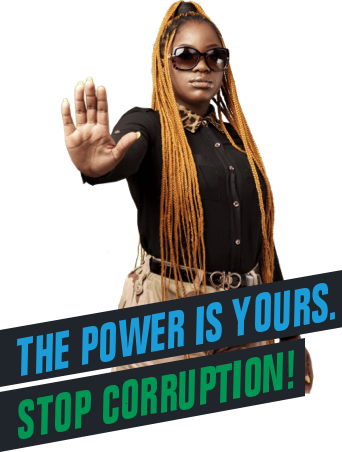Exposing every-day corruption in Zambia

What is corruption?
Corruption is the abuse of power to benefit the individual. It is a fast growing problem in many countries, including Zambia.
Corruption can take many forms, and it can involve making financial or sexual gains, and deliberately delaying service. It has strong negative effects, as it denies people access to health, jobs, education, food and water, and perpetuates poverty.
What is corruption?
Corruption is an abuse of power to benefit the individual. It is a fast growing problem in many countries, including Zambia.
Corruption can take many forms, and it can involve making financial or sexual gains, and deliberately delaying service. It has strong negative effects, as it denies people access to health, jobs, education, food and water, and perpetuates poverty.

This is what corruption can look like
-

Asking for sex
Corruption involves asking for not only money, but also for sex in exchange of jobs, studies, good grades or access to services. This happens often to women and girls in particular. This is a form of corruption, and just because it is so common, it does not mean this is how it should be. Many women and girls struggle to speak up because of feelings of shame and guilt – but it is not their fault.
-

Asking for money to access services that should be free
In Zambia, many public services like health care and education are free. Therefore, you should not be asked to make a payment to see a doctor, to enroll your child to a public school or find work. Someone might suggest that if you give them some money, you might be able to access these services quicker. As these services are supposed to be free, it is likely that this is corruption, and the person will take that money for themselves.
-

Asking for money for you to avoid a fine
You might have been stopped because of an alleged traffic violation, for example speeding or dangerous driving. If you are asked to make a payment without an official receipt or for you to be able to resolve the matter quickly, it is likely to be corruption.
-

Excluding community from land deals
Corruption in land governance is commonly defined as the abuse of entrusted power for private gain while carrying out the functions of land administration and land management. When land investors target countries with weak governance, the risk of corruption is high. Land corruption takes many forms such as excluding a community from participating in land deals that impact their lives.
Help us expose corruption
Corruption is experienced on a daily basis by many people in Zambia and has devastating effects on their lives. However, we rarely talk about it.
The prevalence of corruption and silence around it make corruption feel like an inevitable part of our daily lives. But it does not have to be this way together, we have the power to stop corruption. We are here to give this a voice.
That is why you and your story are important to fight corruption. By sharing you story about your experience with corruption, you can help us to:
-

 Expose the real scale of every-day corruption in Zambia
Expose the real scale of every-day corruption in Zambia -

 Challenge the notion that corruption is the norm
Challenge the notion that corruption is the norm -

 Encourage others to open up and share their stories
Encourage others to open up and share their stories
Doing this together, we can kick-start the change. It might not be immediate, but it will start a movement.
Share your story
Fill in the form below and tell us where and how you have experienced corruption. Stories shared by you and others will be posted on our website to raise awareness and to give you a voice.
-
1. Tell us what happened. Where have you encountered corruption? What did you do?
-
2. Your story will be shared on this website after being reviewed by our team to make sure that it does not include any identifiable information
-
3. Submit your story anonymously
-
4. Do not add any identifiable information about yourself and other people – if you do, we will not be able to post your story
Please note that your story will be shared on this website to increase awareness of corruption in Zambia. If instead you would like to make an official report of a corruption case for our team to investigate, you can do so here. We will work with you to learn more about the case and then approach the institution where it happened, and work with them to prevent it from happening again.
[iframe src=”https://reportcorruption-tizalac.org/submitstory.php” height=”920px” width=”100%” scrolling=”no” class=”iframe-class” frameborder=”0″]
-
“I went to get a driving license at the RATSA office in Lusaka province and I was told that I don’t need to go and drive the car, instead I should just give them a K500 to give the supervisor and his guys and my license will be out. It is a requirement for one who needs a driving license to have their driving skills tested by RTSA officers but that was not the case for me because they asked me to bribe them.”
-
“I was asked by my lecturer to come in to his office. We discussed classes, and then he asked me to have sex with him so that I continue receiving high grades. I wanted to speak to my university but I knew that they had no reliable reporting mechanism, and I felt that nothing would be done. I also felt that it was my fault. It took a long time to realise that it was not my fault, and what he did was wrong.”
-
“My child was sick and I went to a hospital in my community. There were a lot of people waiting to see a doctor. The receptionist told me that I could get a better place in the queue if I paid a small fee. It sounded normal to me, and so I did that. They didn’t give me a receipt for it. Speaking to my friend later on, I understood that I did not have to pay, and they just kept my money for themselves.”
-
“A traffic officer once had me pay him a k300 because he claimed that I drove when the traffic lights were orange turning red and yet I drove when the lights were blinking green. Funny thing is there were about 5 other cars behind me that he didn’t stop, I will never forget that day and I still remember his and the female officers’ faces.”
About Transparency International Zambia
TI-Z is a local chapter of the global civil society movement Transparency International. It is a non-profit making non-governmental organization with a registered office in Lusaka; dedicated towards the fight against corruption and the promotion of transparency, integrity, accountability and generally good governance in the discharge of public functions. TI-Z has a Vision statement of having A Zambia anchored on citizens and institutions of integrity and Mission statement being a leading anti-corruption crusader contributing to Zambia’s development based on a culture of integrity, transparency and accountability through the promotion of good governance and zero tolerance to corruption.
The main goal of TI-Z current strategic plan is to contribute to the reduction of corruption through promotion of good governance in Zambia by upholding the following general organizational objectives:To effectively and efficiently play the role of a watchdog institution against corruption and to be catalytic in the promotion of integrity and good governance in Zambia;
> To promote constructive debate and dialogue among various actors on the situation of corruption, good governance and integrity in Zambia;
> To develop sustainable coalitions for the purposes of joint action and enhance information sharing among various stakeholders; and
> To develop the organizational and human capacities of various actors to effectively deal with issues of corruption, good governance and integrity
READ MORE